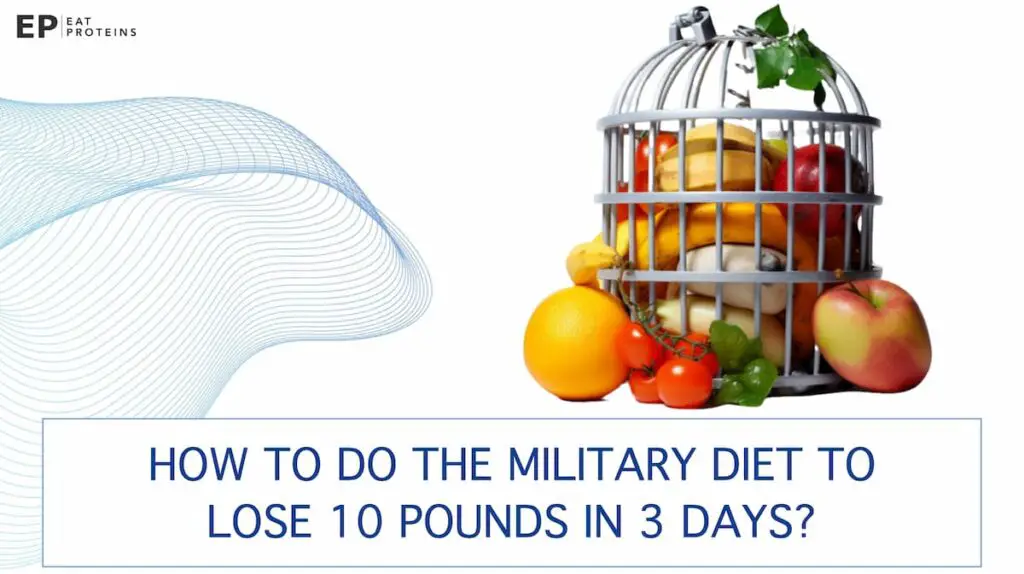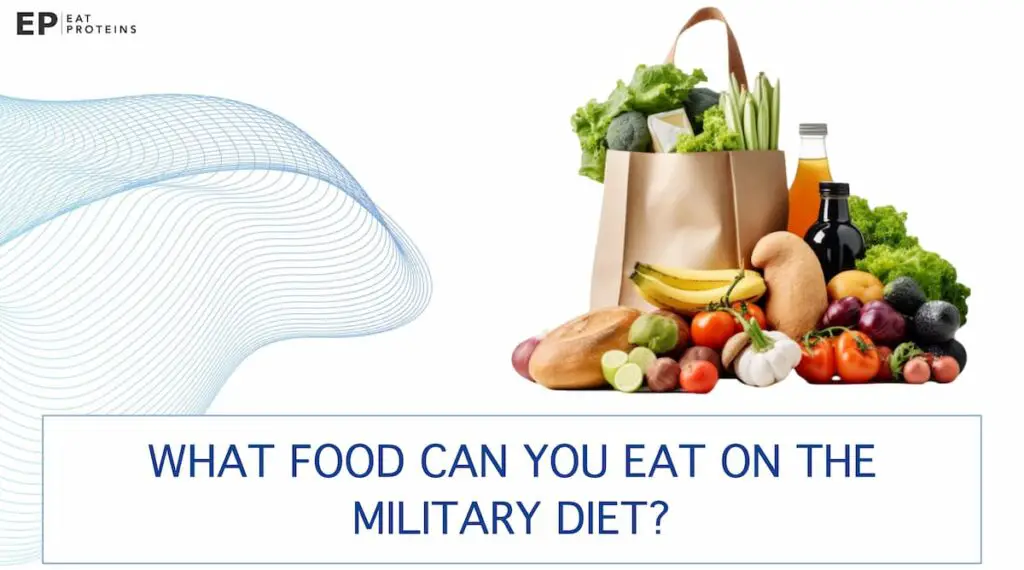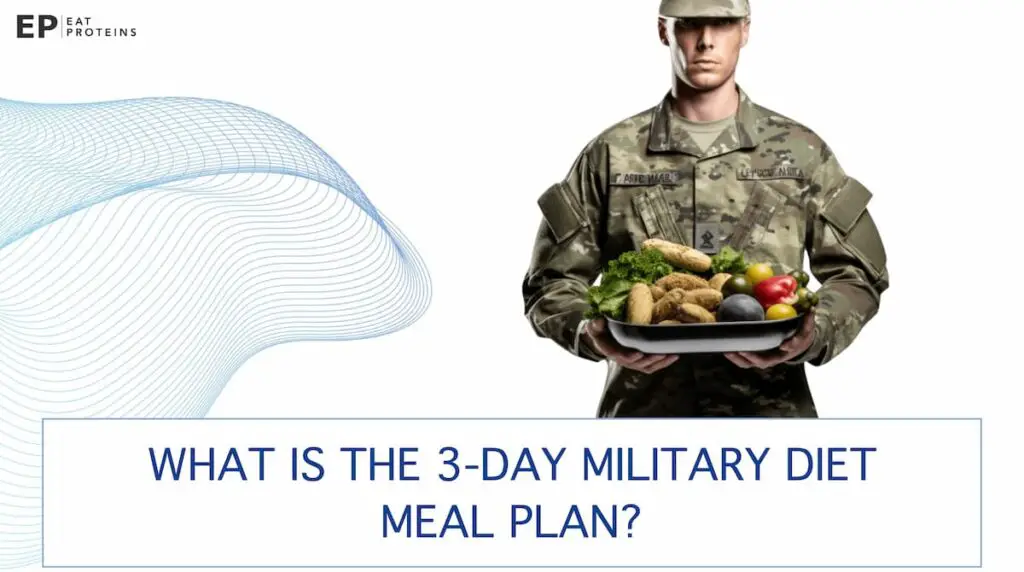The Military Diet refers to a three-day weight loss fad diet plan that claims to help you lose 10 pounds in a week. It involves strict meal plans, including specific food items like coffee, grapefruit, bananas, tuna, and ice cream. However, the long-term effectiveness and sustainability of this diet are uncertain, and it is important to consult a healthcare professional before starting any extreme diet like the Military Diet.
What is the Military Diet?
The Military Diet is a short-term, 3-day diet plan designed for rapid weight loss, claiming to help individuals lose up to 4.5 kilograms (approximately 10 pounds) in 7 days. The diet involves a low-calorie regimen of “chemically compatible” foods intended to burn fat and boost metabolism.
However, a 2022 study by Marius Baranauskas from Panevėžys University of Applied Sciences suggests that Rapid Weight Loss (RWL) methods, similar to those promoted by the Military Diet, can have negative health impacts, including significant muscle damage. Although following the Military Diet for a month can result in a weight loss of up to 30 pounds, the diet is recommended only for emergency situations where quick weight loss is needed. The Military Diet does not lead to sustainable healthy habits or maintainable weight loss.
What is the history of the Military Diet?
The “Military Diet” was not created by the military but gained popularity through a letter written by an English undertaker. It originated in the 1960s and was falsely associated with the Air Force, despite lacking any official endorsement. This crash diet focuses on calorie counting rather than nutrition and aims to help individuals lose 10 pounds in three days.
The Military diet is not recommended by doctors and lacks long-term efficacy. Instead, experts emphasize the importance of forming healthy eating habits over time.
How does the Military Diet work?
The Military Diet operates on the principle of creating a calorie deficit by cycling through three days of low-calorie intake (1,400, 1,200, and 1,100 calories), followed by four days of slightly higher caloric consumption. This approach is specifically designed to promote fat burning, kickstart metabolism, and maintain steady energy levels without causing fluctuations in blood sugar.

According to the Military Diet guidelines, the three-day-on, four-day-off cycle aims to prevent metabolic slowdown, a common issue in long-term diet plans. For maximum effectiveness, it’s recommended to repeat this cycle four times over a month.
What is the recommended duration for staying on the Military Diet?
The recommended duration for staying on the Military Diet is 4 weeks, and it is not advised to follow the diet for longer than that. Although the diet may offer rapid weight loss, its long-term sustainability is questionable due to its restrictive nature and lack of emphasis on exercise or broader lifestyle changes. According to a 2021 study by Alice Bellicha from Sorbonne University, long-term weight loss and fat reduction are more effectively achieved through exercise training programs.
What are the Military Diet reviews?
The reviews on the Military Diet are mixed but generally lean towards the positive for short-term weight loss goals. Users mentioned losing a few pounds and felt that the diet helped reset their eating habits, leading them to consume smaller portions.
However, other people found the Military diet to be monotonous and would not want to repeat it, despite experiencing weight loss. Concerns over food substitutions, such as for tuna and grapefruit, were also raised, suggesting that this fad diet may not be suitable for everyone due to dietary restrictions or personal preferences.
How high is the success rate among people who try the Military Diet?
The success rate among people who try the Military Diet appears to vary, with some users reporting losing up to 10 lbs in a week and others indicating that the weight loss is mostly water weight. Anecdotal reports suggest that the diet can help you lose weight quickly, especially if you are overweight, but it is generally not recommended for sustainable, long-term weight loss.
The Military diet is criticized for its restrictive nature, and experts note that weight loss can be difficult to maintain without a more balanced approach that includes exercise and healthier eating habits.
What are the health benefits of the Military Diet?
The health benefits of the Military Diet, as outlined in the list below, include weight loss, improved portion control, increased nutrient intake, and a structured eating plan.

- Effective weight loss: The Military Diet is designed to help you shed pounds quickly and efficiently.
- Portion control: Following this diet can teach you about appropriate portion sizes and help you develop healthier eating habits.
- Structured eating plan: The Military Diet provides a clear and structured meal plan, which can be helpful for individuals who prefer a more regimented approach to eating.
- Increased nutrient intake: Despite its low-calorie count, the diet includes a wide variety of foods to ensure you receive essential nutrients.
- Reduced cravings: By following this eating plan, you may experience a decrease in cravings for unhealthy foods.
- Convenient and affordable: The Military Diet focuses on basic and readily available ingredients, making it easy to follow and budget-friendly.
- Short-term commitment: The diet is typically followed for three days at a time, making it a manageable and less overwhelming option for those seeking quick results.
- Psychological benefits: Successfully completing the Military Diet can boost your confidence and motivate you to continue making healthier choices.
What are the cardiovascular benefits of the Military Diet?
A low-calorie diet of 1,200 calories per day, as featured in The Military Diet, has been found to significantly lower plasma total cholesterol, LDL cholesterol, and triglycerides. However, it had no significant impact on blood pressure, according to a 1997 study published in the European Journal of Clinical Nutrition by Professor Michael Lean from Glasgow Royal Infirmary.
What are the health risks of the Military Diet?
First sentence: The health risks of the Military Diet diet should be considered before starting the meal plan. Here are the potential risks associated with following a Military Diet diet:
- Nutrient deficiencies: Consuming a limited number of calories in a Military Diet may make it challenging to obtain all the necessary nutrients for optimal health.
- Muscle loss: Severely restricting calories on a Military Diet can lead to muscle loss, as the body may break down muscle tissue for energy.
- Slowed metabolism: Drastically reducing calorie intake during the Military Diet can cause the body to adapt by slowing down metabolism, making weight loss more difficult in the long term.
- Fatigue and low energy levels: Inadequate calorie intake in the Military Diet can result in low energy levels, fatigue, and difficulty performing daily activities.
- Nutrient imbalances: With limited calories, the Military Diet can be difficult to achieve a balanced intake of macronutrients (carbohydrates, proteins, and fats) and micronutrients (vitamins and minerals).
- Increased risk of binge eating: Severely restricting calories can potentially lead to increased cravings and a higher likelihood of binge eating episodes.
- Gallbladder issues: Rapid weight loss on a Military Diet associated with low-calorie diets can increase the risk of developing gallstones.
- Mood swings and irritability: Inadequate calorie intake can impact mood and contribute to irritability, making it challenging to adhere to the Military Diet plan.
- Unsustainability: Following a very low-calorie Military Diet long-term can be difficult to maintain and may result in a cycle of weight loss and regain. It is important to consult with a healthcare professional or registered dietitian before starting any restrictive diet to ensure it is appropriate for your individual needs and health goals.
What are the long-term side effects of the Military Diet?
The long-term side effects of the Military Diet are not well-documented as it is intended to be a short-term weight loss plan. The diet is very low in calories and lacks balanced nutrition. This can lead to nutrient deficiencies and may not be sustainable for long-term weight loss or overall health.
Does the Military Diet have any impact on muscle mass?
Yes, the Military Diet can hinder muscle growth. According to a 2012 study by Philip Atherton from the University of Nottingham, muscle protein synthesis (MPS), which is crucial for muscle growth, is influenced by nutrient availability and is maximized with resistance exercise at higher intensities. Without sufficient nutrient intake, particularly in a low-calorie diet like the Military Diet, the anabolic response that drives muscle growth could be compromised, even when exercise is factored in.
How to do the Military Diet to lose 10 pounds in 3 days?
The Military Diet is not easy to do as it requires a three-day weight loss challenge following a specific meal plan with four days off. Here is a step-by-step guide on how to do the Military Diet.

- Start by planning your meals for the three diet days.
- On the diet days, make sure to strictly follow the meal plan, including portion sizes and specific food combinations.
- Drink plenty of water throughout the day, as it is the best choice of beverage on the Military Diet. You can also have black coffee, but avoid adding extra calories with creamer or sugar. Stevia is the only recommended artificial sweetener if you choose to use one.
- During the four off days, you can eat normally but try to maintain a balanced and healthy diet. If you want to continue losing weight during these days, you can follow a 1500-calorie diet plan.
- If you have any dietary restrictions or preferences, you can substitute the recommended food items with alternatives that suit your needs. There are vegetarian and vegan versions of the Military Diet available, and you can find a list of substitutions on the Military Diet website.
- Repeat the three-day diet plan as often as needed until you reach your weight loss goal. Remember to listen to your body and consult a healthcare professional before starting any new diet or exercise regimen.
How to Survive the Military Diet Day 1?
To survive Day 1 of the Military Diet, start by maintaining a meal journal to keep track of your food intake and ensure you’re sticking to the plan’s specific requirements.
Eating slowly can help you feel fuller faster, potentially making it easier to adhere to the low-calorie guidelines. Incorporate zero-calorie beverages like black coffee to help suppress appetite and provide a small energy boost.
Staying active with light exercises can also help distract from hunger pangs and contribute to calorie burning. Lastly, refer to the Eat Proteins Blog for specific tips and substitutes like “Peanut Butter Substitutes” or “Zero Calorie Foods” to make the diet more manageable.
What food can you eat on the Military Diet?
On the Military Diet, you can eat a variety of foods including coffee, grapefruit, bananas, apples, whole-wheat bread, peanut butter, eggs, tuna, hot dogs, meat, green beans, broccoli, carrots, saltine crackers, cottage cheese, cheddar cheese, and vanilla ice cream.

- Coffee
- Grapefruit
- Bananas
- Apples
- Whole-wheat bread
- Peanut butter
- Eggs
- Tuna
- Hot dogs
- Meat
- Green beans
- Broccoli
- Carrots
- Saltine crackers
- Cottage cheese
- Cheddar cheese
- Vanilla ice cream
What food substitutions are allowed on the Military Diet?
This table shows the food substitutions for the Military Diet.
| Meal | Original Food Item | Substitution Options |
|---|---|---|
| Day 1 | ||
| Breakfast | 1/2 Grapefruit | 1/2 tsp of baking soda in water |
| 1 Slice of Toast | 1/8 cup sunflower seeds 1/2 cup whole grain cereal 1/2 high protein bar 1/4 cup yogurt with 1/2 tsp flax seeds one tortilla two rice cakes | |
| 2 Tbsp Peanut Butter | Almond butter Cashew butter Pumpkin butter Soy butter Sunflower seed butter Hummus Bean dip, Plain sunflower seeds | |
| 1 cup Coffee/Tea | Fruit-flavored yogurt Apple juice Non-dairy ice cream like Coconut Bliss | |
| Lunch | 1/2 Cup Tuna | Grilled sushi-grade tuna Lean meat Cottage cheese Chicken Tofu Almonds |
| Dinner | 3 oz Meat | Lentils Beans Tofu Portobello mushrooms |
| 1 cup Green Beans | Lettuce Tomatoes Spinach Other green vegetable | |
| 1/2 Banana | 2 Kiwis 1 cup of Papaya 2 Apricots | |
| 1 small Apple | Plums Peaches Grapes Zucchini Pears Dried apricots | |
| 1 cup Vanilla Ice Cream | Fruit-flavored yogurt Apple juice Non-dairy ice cream like Coconut Bliss |
What foods are not allowed during a 3-day Military diet?
The restricted foods on the Military Diet include high-sugar and high-fat items, such as desserts and fried foods. But fear not, there are substitutes available. Here are three options to satisfy your cravings while sticking to the diet:
- Instead of sugary desserts, opt for fresh fruits or low-calorie yogurt. These options provide a sweet taste without the excess sugar and calories.
- Replace fried foods with grilled or baked alternatives. Grilling or baking your favorite foods can still give you that satisfying crunch without the added fat.
- Swap out high-fat dressings and sauces for healthier options like vinaigrettes or homemade alternatives. These alternatives can add flavor to your meals without the guilt.
What is the 3-day Military diet meal plan?
The following is the 3-day Military diet meal plan.

Day 1
- Breakfast: 1/2 Grapefruit, 1 Slice of Toast, 2 Tablespoons of Peanut Butter, and 1 cup of Coffee or Tea (with caffeine)
- Lunch: 1/2 Cup of Tuna, 1 Slice of Toast, and 1 cup of Coffee or Tea (with caffeine)
- Dinner: 3 ounces of any type of meat, 1 cup of green beans, 1/2 banana, 1 small apple, and 1 cup of vanilla ice cream
Day 2
- Breakfast: 1 egg, 1 slice of toast, and 1/2 banana
- Lunch: 1 cup of cottage cheese, 1 hard-boiled egg, and 5 saltine crackers
- Dinner: 2 hot dogs (no bun), 1 cup of broccoli, 1/2 cup of carrots, 1/2 banana, and 1/2 cup of vanilla ice cream
Day 3
- Breakfast: 5 saltine crackers, 1 slice of cheddar cheese, and 1 small apple
- Lunch: 1 hard-boiled egg (or cooked however you like), and 1 slice of toast
- Dinner: 1 cup of tuna, 1/2 banana, and 1 cup of vanilla ice cream
What do you eat during the 4-day off Military diet?
The 4-day off meal plan for the Military Diet is designed to help you continue your weight loss journey even on your days off the diet. It is recommended to follow a 1,500-calorie or less diet on these days to maintain momentum and achieve the best results.
The plan consists of one breakfast, one lunch, one dinner, and two snacks each day. Here is a table with a breakdown of the options you can choose from.
| Meal Time | Options |
|---|---|
| Breakfast | Yogurt Parfait Cheerful Morning (egg on toast) Bagel and Lox Cinnamon Oatmeal Walnut Waffles and Berries Florentine Egg and English Muffin Pear and almond butter Toast Tomato-Basil Ricotta Toast Banana & Honey Smoothie |
| Lunch | Tuna Pita Protein Salad Mediterranean Plate Veggie Lunch Vegetarian Quesadilla Tuna Walnut Greens Turkey Pear Swiss Sandwich Black-Bean Wrap |
| Dinner | Shrimp and Zucchini Pasta Hot Peanut Chicken Wraps Sushi Pepper Cilantro Fajitas Black Bean and Zucchini Quesadilla Tortilla and Cheese Chili Florentine Goat Cheese Flatbread Shrimp Fried Brown Rice Cheese and Artichoke Pizza Stuffed Chili and Cheese Potato Italian Sausage Pasta |
| Snacks | Various fruits (e.g., apples, banana) Nuts (e.g., almonds) Vegetables with hummus or cottage cheese Yogurt Popcorn |
What are the facts about the Military Diet?
The Military Diet has garnered controversy for its lack of scientific backing and inclusion of processed foods.
This is the list of 5 facts about the Military Diet.
- Not Military-Endorsed: Despite its name, the Military Diet is not endorsed by any branch of the U.S. military.
- Includes Processed Foods: The diet includes processed junk foods like ice cream and hot dogs, which lack nutritional value.
- Short-Term Weight Loss: While the diet may result in short-term weight loss, it’s primarily water and muscle loss, not fat loss.
- Negative Side Effects: Severe calorie restriction can lead to side effects like brain fog, poor sleep, and irritability.
- Unsustainable: Experts criticize the diet for being unsustainable long-term and potentially harmful to those with an unhealthy relationship with food.
Why ice cream is on the military diet?
Ice cream is included in the Military Diet to create excitement and appeal to users, but it is not a healthy or nutritious choice. Although the Military Diet may promise rapid weight loss, it primarily causes water and muscle loss rather than fat loss. Including ice cream in the diet does not align with long-term, healthy eating habits and may be harmful to those with an unhealthy relationship with food, according to experts.
What can you drink on the military diet?
On the Military Diet, you are allowed to drink water, black coffee, and unsweetened tea. These beverages are calorie-free and do not interfere with the diet’s restrictions on food. It is recommended to avoid high-calorie beverages such as sugary drinks and alcohol, as they can hinder weight loss progress.
How much water should you drink on the Military Diet?
On the Military Diet you should stay hydrated and drink at least 8 cups (64 ounces) of water per day, or more if you are physically active. Adequate water intake can help with digestion, satiety, and proper bodily functions.
What are some alternative healthy diets comparable to the Military Diet?
Some alternative healthy diets comparable to the Military Diet include the Mediterranean Diet, which focuses on fruits, vegetables, and lean proteins, and has been shown to improve heart health. The DASH (Dietary Approaches to Stop Hypertension) Diet is another option that aims to lower blood pressure and is rich in fruits, vegetables, and low-fat dairy products. The Low-Carb Diet restricts carbohydrates, primarily from sugary foods and bread, and is often used for weight loss or diabetes management.
What are the diets similar to the Military Diet?
Diets similar to the Military Diet include Intermittent Fasting, where eating is restricted to certain hours of the day; the Alternate Day Fasting (ADF) diet, which involves cycling between days of eating and fasting; and the Optavia and Skinny Box diets, which also focus on quick weight loss through portion-controlled, low-calorie meal plans.
These diets share the Military Diet’s emphasis on rapid weight loss, but methods and food choices may vary. It’s important to consult a healthcare professional before starting any of these diets for personalized advice and safety precautions.
How does the Military Diet compare to other fad diets?
The Military Diet is similar to other fad diets in that it promises quick weight loss results but lacks substantial scientific evidence to support its long-term effectiveness or nutritional adequacy. Unlike some fad diets like The Zone Diet or Atkins Diet, which focus on specific types of nutrients or food groups, the Military Diet is more restrictive and has a set menu for a short duration, typically three days.
While some fad diets may offer more variety and nutritional balance, the Military Diet’s highly restrictive nature could make it difficult to maintain in the long term, and it may not provide sufficient nutrients for overall health.

